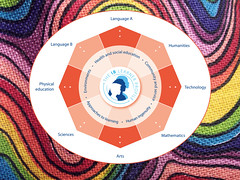 Many of you who follow me on Twitter know that besides being an teacher dedicated to MYP and international education in general, I am a yogini. I have been studying yoga for only about 4 years, but in January 2008 I made a choice to get really serious about it (if you’re curious about the story behind that decision, IM me or Tweet me and I will share with you, as it was very much an “a-ha” moment). Since making that decision — only a little more than a year ago — I have learned so much about yoga, meditation, the human body, and myself — all dimensions of myself, including physical, intellectual, emotional, and spiritual. To say that yoga has been transformational for me would be just beginning to describe the journey I’ve been on. It has been, and continues to be, a tremendously rewarding learning experience in the most holistic way imaginable. All aspects of myself are addressed through yoga. And believe me, this was not how I intended it to be. I began to take yoga seriously more or less because I wanted to do something physical and to feel strong. Yet, my practice has evolved into something so much deeper and more meaningful than just the physical asanas.
Many of you who follow me on Twitter know that besides being an teacher dedicated to MYP and international education in general, I am a yogini. I have been studying yoga for only about 4 years, but in January 2008 I made a choice to get really serious about it (if you’re curious about the story behind that decision, IM me or Tweet me and I will share with you, as it was very much an “a-ha” moment). Since making that decision — only a little more than a year ago — I have learned so much about yoga, meditation, the human body, and myself — all dimensions of myself, including physical, intellectual, emotional, and spiritual. To say that yoga has been transformational for me would be just beginning to describe the journey I’ve been on. It has been, and continues to be, a tremendously rewarding learning experience in the most holistic way imaginable. All aspects of myself are addressed through yoga. And believe me, this was not how I intended it to be. I began to take yoga seriously more or less because I wanted to do something physical and to feel strong. Yet, my practice has evolved into something so much deeper and more meaningful than just the physical asanas.
One of the many wonderful teachers I have had the pleasure of working with is Twee Merrigan. Twee is a dynamic and focused teacher whose openness and generosity is not only overflowing, but infectious. Her energy is genuine, and she wants her students to be genuine, too. I think this is what I appreciate most about Twee — that she expects you to be no one other than who you are. However, Twee recognizes that sometimes things get out of balance. And, let’s face it: things are often out of balance for various reasons.

Let’s look at education for a minute. (Not forgetting, of course, that this is an education blog, first and foremost!) One of the reasons I began this blog was an effort to balance some inequities I saw that were unaddressed in The System:
- the unfairness of some prevalent methods of assessment and grading practices
- the treatment of viewing and speaking skills as secondary to reading and writing
- the lack of access to technology in schools, or — even worse — the use of abundantly available technology being used to “do” teaching and learning the way we did 15 or even 5 years ago, despite the fact that our world has changed
- the lack of student choice in “standard” classrooms, being primarily driven by choices made by curriculum, teachers’ backgrounds, or admin decisions

Twee has recently written about how to, in the words of The Doors, “Break on through to the other side.” She suggests we re-name Global Warming and Economic Crisis to Global Balancing and Economic Re-alignment. Think about this for a minute. This is really what we are trying to do: we are trying to balance everything in the world.
So my question of the moment is this: How do we re-align education?
My initial response is, “I have no idea.” My second response is, “I have a thousand ideas!” And then I get overwhelmed — out of balance again.
Secondary questions, beneath the “How do we re-align education?” umbrella are:
- Can we re-align education? or does it have to be completely re-designed — that is, do we have to throw it all away and start all over?
- What parts of education need the most alignment attention? Is it the issues of academic vs. creative knowledge, as Ken Robinson emphasizes in Out of Our Minds? Or is it something else?
- Silhouette 3 – Surya Namaskar by Mahesh Khanna under this license
- Free Child Walking on White Round Spheres Creative Commons by Pink Sherbert (D Sharon Pruitt) under this license
- Dark Coast by Nosha under this license



